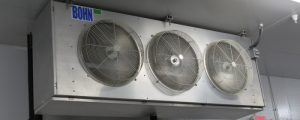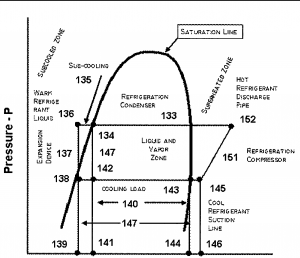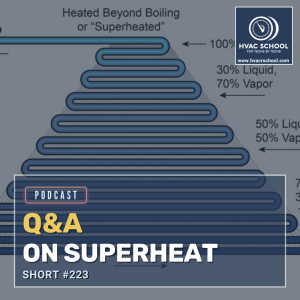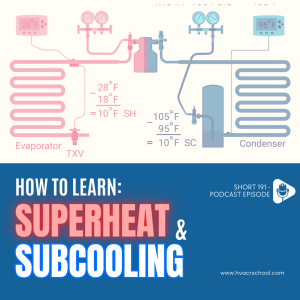BACK
 Solving Superheat
Solving Superheat
 What does “Saturated State” mean for Techs?
What does “Saturated State” mean for Techs?
 TD of Refrigeration Evaporators
TD of Refrigeration Evaporators
 What Is Temperature Glide?
What Is Temperature Glide?
 Superheat Talk w/ JD Kelly
Superheat Talk w/ JD Kelly
 Q&A on Superheat – Short #223
Q&A on Superheat – Short #223
 Q&A – How to Learn Superheat & Subcooling – Short #191
Q&A – How to Learn Superheat & Subcooling – Short #191
 Why A/C Units Freeze w/ Eric Shidell (Podcast)
Why A/C Units Freeze w/ Eric Shidell (Podcast)
#saturation
Tech Tips:

In this article, we’ll discuss solving superheat using this diagnostic sheet to help us better understand how it is calculated and from where it is derived. I want to thank Ty Branaman for helping me develop these sheets that will hopefully aid in a better understanding of some of the basic HVAC measurements that both […]
Read more

As we often do in these tech tips, we will start with the common and more practical explanation of saturation and then move to the more technical and nerdy explanation later. When we say “at saturation” or “saturated” in the HVAC/R trade, we are generally referring to the refrigerant that is in the process of […]
Read more

We have discussed DTD (design temperature difference) quite a bit for air conditioning applications, but what about refrigeration? Let's start by defining our terms again. Suction Saturation Temperature The saturation temperature is the temperature at which the refrigerant will be at a given pressure if it is currently changing state. This change of state would […]
Read more

We've all heard about glide, but what is it really, and how does it affect our system? Glide, or temperature glide, is the difference between the bubble point and the dew point of the zeotropic refrigerant mixture. Well, that wasn't very helpful, was it? All we did was introduce new terms without defining them, […]
Read more
Podcasts:

In this episode of the HVAC School podcast, host Bryan discusses superheat with guest JD, who recently co-authored an article on the topic with Ty Branaman. The conversation explores the often misunderstood concept of superheat, its importance in HVAC diagnostics, and common misconceptions technicians have when measuring and interpreting it. Bryan begins by sharing […]
Read more

In this short Q&A podcast episode, Bryan answers a listener-submitted question about superheat, including what it is and how we measure it. Superheat is the number of degrees a refrigerant is above its saturation point. The saturation point is where you will have a liquid-vapor mix, so superheat only exists when a substance is […]
Read more

In this short podcast episode, Bryan answers an audience member's question and explains how to learn superheat & subcooling, two fundamental aspects of the HVAC/R trade. You can submit questions of your own at https://www.speakpipe.com/hvacschool. Saturation is when a substance is in the liquid and vapor state in the same place. Eugene Silberstein likes to […]
Read more

In this episode, Bryan speaks with Eric Shidell about some of the basics of system freezing, what causes it, and what to do about it. Freezing is a normal part of some equipment, such as low-temperature freezers and outdoor units on heat pumps. On straight-cooling systems, freezing is NOT normal and indicates poor operation. Ice […]
Read more








